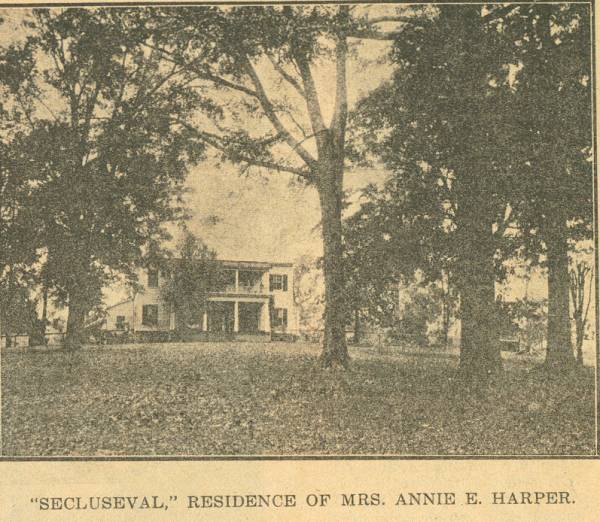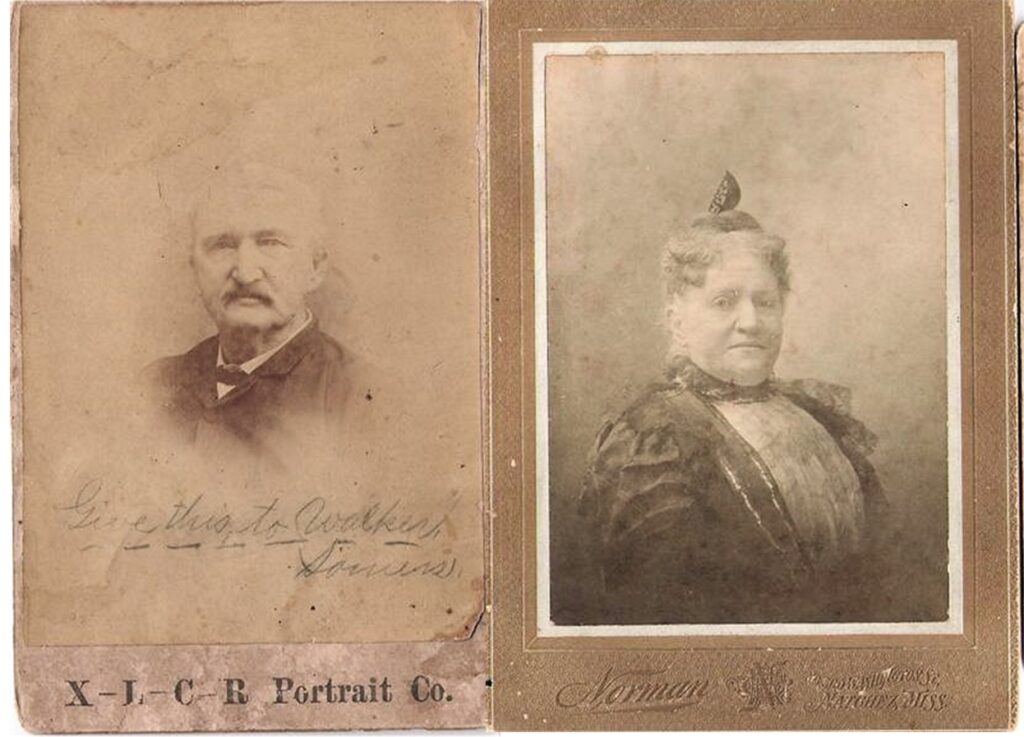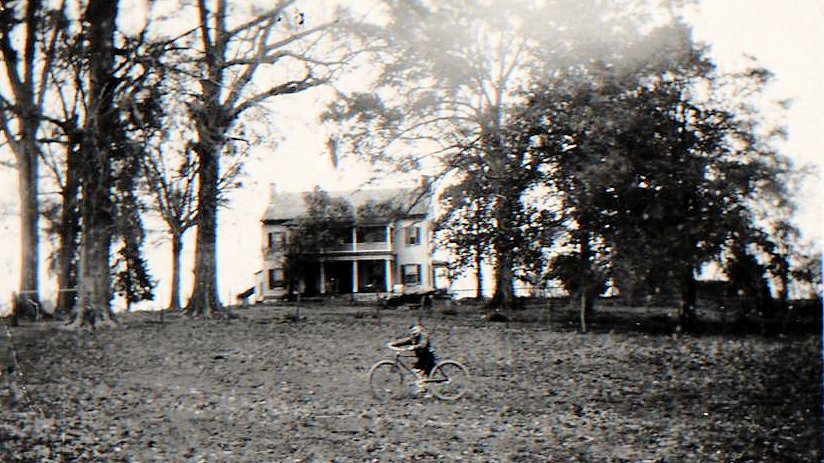Annie E. Coulson Harper was born in 1840 to prominent clothing merchant Mr. John S. Coulson and his wife Elizabeth in Natchez, Mississippi. Annie was formally educated at The Spingler Institute for Young Ladies in New York City.
“She left this school an accomplished intellectual and refined young lady, eminently fitted to shine in any society, and her subsequent career has fully carried out the promise she gave in early womanhood. She is a leader in all matters of a public nature where members of her sex are called upon to participate, and her example of earnest Christian endeavor is well worthy of emulation.” [1]
In 1864, she married widower William L. Harper. At the Battle of Shiloh, Harper was severely wounded in the leg. Harper completed his Secluseval mansion near his parent’s home The Locusts in 1846. They were married for over 30 years.

Annie Harper penned a journal for her daughter in October 1876. She records her story writing:
“My dear daughter- As you grow older you will hear constant references to the war of secession– I desire that you shall know more of that struggle, and invest it with greater interest than children usually do their text books of United States History—so have resolved for you some reminiscences of the period…” [2]
This journal tells of her struggles during and after the Civil War. The following excerpts from her journal are transcribed exactly as written:
Secession ~ My heart shrinks from reopening the scarred wombs those bitter years have left. Sadness covers the South- Men felt the pall settling on them and their hands were powerless to remove it-Soon after it was understood that Lincoln was indeed elected- South Carolina convened her legislature and passed the ordinance of succession severing her connection with the Federal Union.. [3]
How our soldiers were fed & clothed ~ Oh! The sickening record of blood of the next four years. Battle after battle devouring our loved and dearest. Never were newspaper offices so besieged, the daily “Extras” could not be printed fast enough to satisfy the anxious impatient hearts. When the news came of a battle in which our boys were engaged, wives and mothers w’d flock to the telegraph office and wait for dispatches, with a consuming anxiety to look at, how much more to feel. The Court house & other public buildings were turned into sewing rooms, where the ladies daily gathered to sew for the soldiers … Vast qualities of clothing were made in an astonishing short time. [4]
Home life during the War ~ The South soon had all her available force in the field, as any one could see by riding over the deserted country. None but very old men were left behind. Not more than five or six young men were left in a country sometimes, and these had furnished substitutes- many plantations for miles were left with none but women, children, and slaves … It was considered disloyal to plant cotton, and the order was given to burn all on hand at your approach of the Union army. For miles around I watched the burning stacks of treasures on the plantations opposite Natchez, where thousands of bales were burned upon the approach of Farragut’s fleet after the fall of New Orleans, as he sailed up the river to invest Vicksburg from below … The old looms were set up, and the old negro woman who understood their use were put to making cloth for the plantation. The ladies learned spinning and weaving from their grandmothers, and really produced very pretty cloth … Flour soon became scarce, and was used as a luxury or for the sick- Coffee was hoarded as gold dust and sugar was very high, as all industries were interrupted by the war. Corn meal was the staple article of food, and many were the devices to make it take the place of flour. Our cake was often made of the fine dust we sifted through tarleton (thin muslin) or course swiss. Fortunately, the hens did not refuse to lay or the cows to give milk, or sad indeed would have been our lot … The coffee drinkers suffered more than any one else. Sliced sweet potatoes roasted brown and made as coffee, was swallowed as a substitute with many grains of allowance. [5]
Then we were aliens without a country: no government to lean upon the grinding despotism of Grant’s followers making American liberty the falsest misnomer upon the face of the earth. Then we were denounced as traitors unworthy of trust, worst of all for a proud people to hear. Every office was filled by men who mocked at our calamity, and fattened upon our misfortunes … The Southern people endured robbery and plunder for twelve long years — Extract the element of hope from a life and you leave the deepest misery. Oppression and despotism in the United State. Think of it. Poor human nature always ready to take advantage of another’s woes— When ignorance is linked to corruption & set above the intelligence of a country behold the result. [6]
The most pitiful of all was the condition in which the negros from the country were plunged, in their haste to “go to freedom.” On every road they came in crowds, mothers carrying their babies, with every site and age streaming along behind. The day of jubilee had come- nearly all left, food, clothing, & fires behind in their forsaken homes. They were gathered the cities by the thousands in what were called “Kraals” (Corrales) without food or shelter. The Gov’t issued rations to this great army of the unemployed, and for a short time they realized the bliss of freedom … but when the summer skies had gone and winters blasts set in, they succumbed to cold and the most terrible diseases … Along the river bank at Natchez, eleven thousand lie buried to whom freedom brought indeed a rest from their labors– The same was true of every post in the South, especially on the river bank the mortality was awful … Many sent word to their old masters “for God’s sake to come end and take them home.” [7]
“In looking backward I again record my thankfulness, that African slavery is gone forever, with so many of the baleful things of the past, I thank God for so much of the purification of the earth, and pray that we may be led into the “Freedom of the truth,” and soon publish the Emancipation proclamation for all races, from the bondage of evil habits, the drink curse, the tobacco curse, and the defilement of immorality…”
References
[1] Biographical and historical memoirs of Mississippi, embracing an authentic and comprehensive account of the chief events in the history of the state and a record of the lives of many of the most worthy and illustrious families and individuals. Chicago: The Goodspeed Publishing Company, 1892. https://babel.hathitrust.org/cgi/pt?id=coo1.ark:/13960/t60584s9h&view=1up&seq=1&skin=2021
[2] Deen, Jeannie Marie., and Annie Harper. “A Southerner’s Legacy : Annie Harper’s Civil War Journal to Her Daughter ” Thesis (M.A)-University of Southern Mississippi, 1979.
[3] Ibid.
[4] Ibid.
[5] Ibid.
[6] Ibid.
[7] Ibid.






